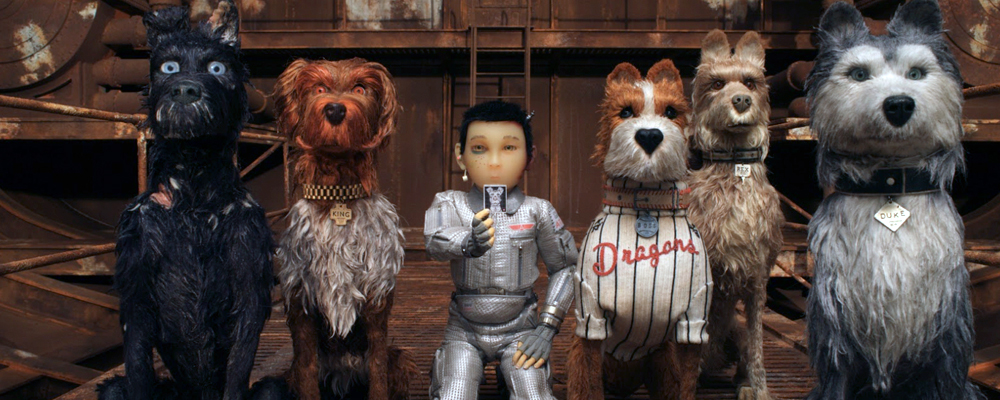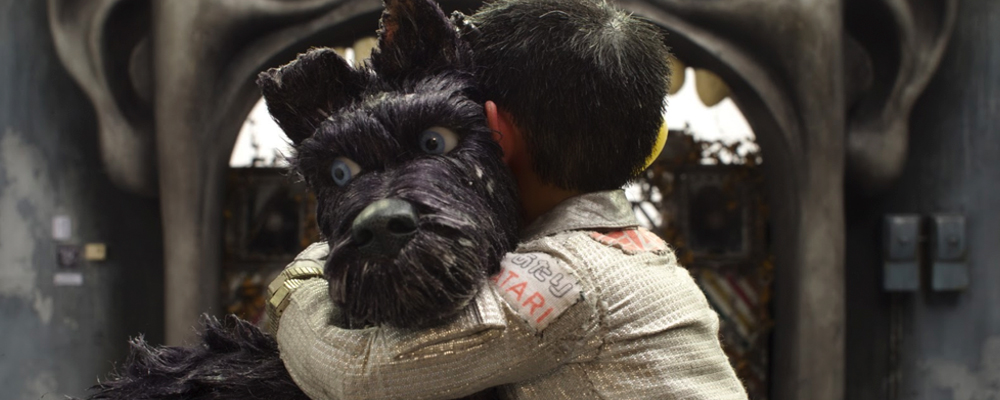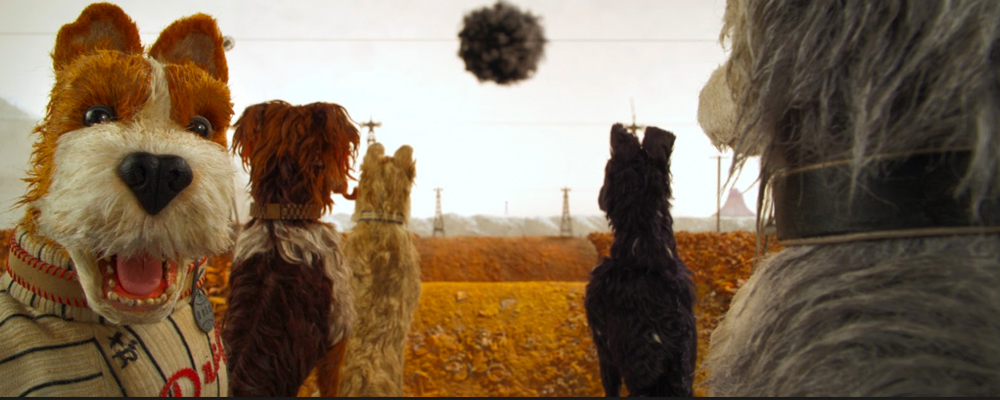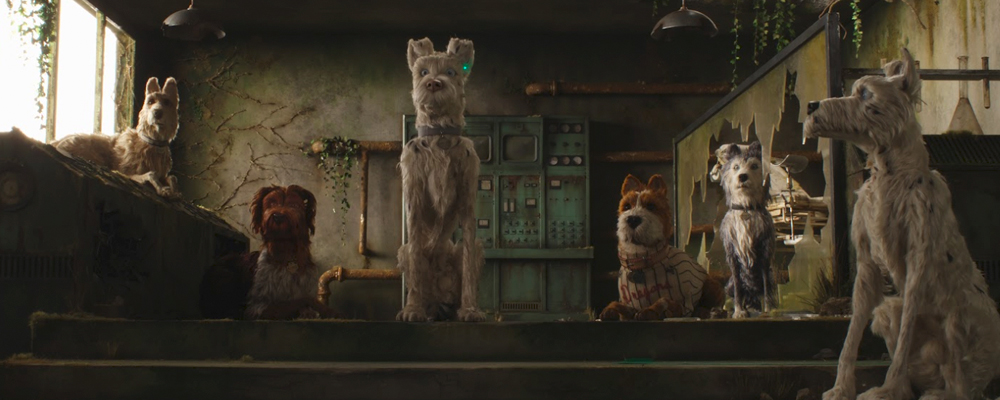Wes Anderson, Bill Murray, Jeff Goldblum and Tilda Swinton Talk the Bonds Between People and Pets in ‘Isle of Dogs’
Aaron Berke
“Isle of Dogs” tells the tale of a fictional island off the coast of Japan. It’s here where all varieties of man’s best friend have been sent to die, ironically, by man. The cat-worshipping mayor of the fictional Megasaki, Japan, instituted the decree after a giant bout of dog-flu struck the city. Now the city’s remaining dogs are all herded together on the island, fighting for survival, looking for purpose, and making some friendships along the way. Early on in the film, a boy named Atari crash lands on the island, searching for his lost pet, Spots, a noble guard dog. The island dogs take up Atari’s mission, and the film becomes an emotional quest to reunite a boy with his best friend.
“Isle of Dogs” is the ninth film directed by Wes Anderson, and his second film to be depicted in the style of stop-motion animation. Anderson, along with co-writer Jason Schwartzman and stars Bill Murray, Jeff Goldblum, Tilda Swinton, Liev Schreiber and Bob Balaban, recently sat down with Entertainment Voice to discuss the quirky new film.
“The point of departure of the movie was as simple as five dogs: Chief, King, Rex, Duke, and Boss, stranded on a garbage dump island. That was literally the entire beginning of the movie,” said Anderson on the script writing process. “But it was always meant to be animated and [that] was when we combined that little idea with another idea we had, which was we wanted to make a movie in Japan. When we put those two things together ideas started coming to us and the story sort of took over.”
“Isle of Dogs” features numerous references to Japanese cinema, particularly in the music, the aesthetics, and the mayor’s resemblance to famed Japanese actor Toshiro Mifune. On top of this, the film also deals with modern political references, particularly in how the dogs’ banishment relates to the concept of ‘the other.’ “Certainly we’re inspired by Japanese cinema, maybe first and foremost. [Akira] Kurasawa and [Hayao] Miyazki are the ones we really talked about the most,” said Anderson. “You know the politics of the movie is an unusual thing because, really, our first [question] was – who did this to [the dogs], who put them out here and why? We had to make a government up and imagine one [along with] local politics. We looked to history and while we were making the movie it sort of seemed that history was repeating itself. So [the writing] was kind of an unusual experience.”
According to co-writer Jason Schwartzman, the key to the movie was creating a variety of dog characters who could possess strong personalities and really stand in for human beings. “From the beginning it was trying to figure out, who are these dogs and what are the rules of this place,” said Schwartzman. “Very quickly it became clear that [our story] wasn’t about dogs, we thought of them as people… Once we all agreed on that approach, we didn’t really look back.”
The dogs on garbage island feature an eclectic mixture of personalities. Jeff Goldblum plays Duke, a character who always has his ear to the ground and professes to love gossip. Goldblum talked about what drives Duke. “Well, that gossip business, trying to do something that [could] allow [my character] to contribute to the group,” Goldblum mused. “But I’m more struck by the heart of that group, the heart of the dog gang. Once they have their task presented to them [they] are so unblinkingly committed to bravely put themselves in harm’s way and die for it. That’s really, I see now, at the heart of what… my character wants to do, what they all wanna do. Come hell or high water, fight for the right thing cause it’s love and there’s no question about it.”
Bill Murray plays Boss, a former baseball mascot who proudly wears his old gear. Murray is a well-known dog lover and had a lot to say about the emotional connection between a man and his dog. “Well I think your relationship with dogs isn’t often a thinking thing, it’s an emotional thing. And so you have to sort of get yourself together to correctly perceive those emotions, to build those feelings [in] getting completely connected. I’ve had some very emotional moments, intimate moments, with my own dogs,” said Murray. “My current dog was attacked and left for dead by coyotes, and he survived and he’s the one I chose from his mother’s litter. I thought he was the smartest one, and he was.”
The dogs on garbage island come in many shapes, sizes and breeds. Tilda Swinton plays Oracle, a wide-eyed pug who appears to be all knowing, but mostly from watching TV. Swinton discussed the bonds between people and dogs, bonds that often transcend words. “Well, you know, words are pretty overestimated, as we know, when it comes to communication. Particularly anybody who has the privilege to have a deep relationship with a dog would know that it’s all about the eyes. And if the eyes are going off in different directions then [communication] is even more [visible] and relayed,” Swinton said thoughtfully. The actress went on to describe her enjoyment with the idea of playing a pug. “I think the idea of [playing] a pug in the first place was… Wes says, Tilda, pug. [I say] that’s it, it’s done. Easy. I’m very, very honored that [Wes] made me a pug. At last. I’m not gonna ask why, but I’m gonna take it.”
Bob Balaban plays King, an old quasi-celebrity dog who used to do commercials and still likes to reminisce about it. Balaban found a lot of common ground with King. “I actually think of King as a very modest celebrity, and I actually didn’t really have to work that hard to think about King because we have many things in common,” said Balaban. “I used to do commercials, [though] never for dog food. And I just felt King was your all-around kind of ‘I’ll be there but I won’t stand out too much’ person. And that was easy.”
Liev Schreiber has a critical role playing the noble Spots, a character who personifies the heroic nature of dog loyalty. “Unlike most of my castmates I was immediately aware when I read this script that it was extremely political, a geo-political piece about oppressive cat regimes that have dominated so much of Western society for the past 50 years,” Schreiber quipped. “I just knew that Spots was an essential part of standing up to that.”
Schreiber also discussed the process of working with Anderson in the recording studio. “I knew when Wes cast me that I wouldn’t get to do a dog voice. I knew that because what he does so beautifully is juxtapose the very human characteristics of the actors that he’s working with with the creature they’re playing,” said Schreiber. “And so I knew, shit, I’m not gonna get to do my funny dog voice. And [the recording process] all went very quickly cause I kind of felt like [Wes] mostly wanted me to do me. Either quicker or slower. That’s what we did and it was really fun.”
Anderson chimed in on the process of working with his actors, something that quickly becomes very fun and fluid. “The part of the movie for me, where I’m working with actors, and we’re having the chance for them to make these performances, it’s really more like a rehearsal,” said Anderson “It’s like a few days of rehearsal, a few hours of rehearsal that we record and we put together the movie from the rehearsal, and the actors can try anything.”
Anderson noted that the recording process for “Isle of Dogs” was extremely quick, sometimes taking no more than hour. Which is one reason why, when Anderson came calling, all his actors said yes. “They had the choice to say no. This [film], everybody said yes, and part of that is because you can’t say ‘I‘m not available.’ Because, well, it’s an hour. The only way to pass is to say ‘I don’t wish to be in your film. I don’t like you and I don’t like dogs.’ So, everybody did say yes,” Anderson laughed.
For “Isle of Dogs,” it’s clear that everyone involved does like dogs quite a bit. The feelings people have about dogs are crucial, both for the characters in the film and the people who brought it to life. Perhaps Bill Murray sums it up best. “[My dog is] the best companion, a very good companion, easy to be with. [For “Isle of Dogs”] that’s what all the actors, actresses had to do was say how [we] feel about dogs,” Murray reflected. “It wasn’t thinking. [We] had to try to get [on] an emotional sort of catapult. And that’s what we were able to do together.”
“Isle of Dogs” opens March 23 in New York, Los Angeles, San Francisco, Washington, D.C. and Austin with a national expansion to follow.




